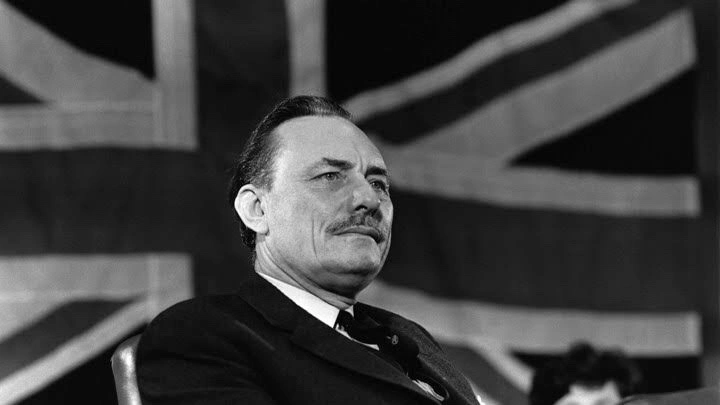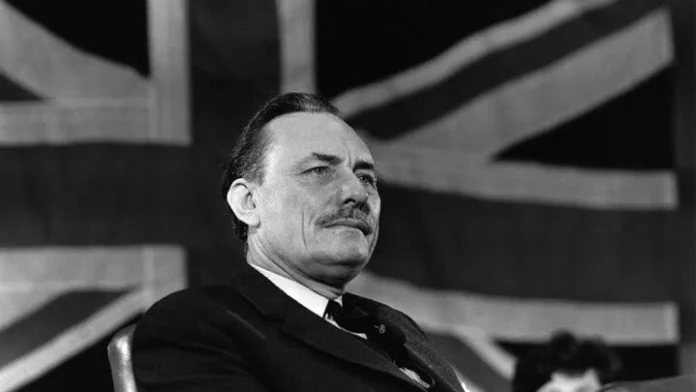
“Those whom the gods wish to destroy, they first make mad. We must be mad, literally mad, as a nation to be permitting the annual inflow of some 50,000 dependants, who are for the most part the material of the future growth of the immigrant-descended population. It is like watching a nation busily engaged in heaping up its own funeral pyre.”
Such were the words of one man whose time came on the 20th April 1968. John Enoch Powell, a classical scholar and Brigadier in WW2, was the Shadow Secretary of State for Defence and a member of the Conservative Party. Nothing in his career would amount to what he said to the General Meeting of the West Midlands Area Conservative Political Centre in Birmingham.
Powell’s observation of those that refuse to see what is before them is marked explicitly:
“The supreme function of statesmanship is to provide against preventable evils. In seeking to do so, it encounters obstacles which are deeply rooted in human nature.
“One is that by the very order of things such evils are not demonstrable until they have occurred: at each stage in their onset there is room for doubt and for dispute whether they be real or imaginary. By the same token, they attract little attention in comparison with current troubles, which are both indisputable and pressing: whence the besetting temptation of all politics to concern itself with the immediate present at the expense of the future.
“Above all, people are disposed to mistake predicting troubles for causing troubles and even for desiring troubles: “If only,” they love to think, “if only people wouldn’t talk about it, it probably wouldn’t happen.” Perhaps this habit goes back to the primitive belief that the word and the thing, the name and the object, are identical. At all events, the discussion of future grave but, with effort now, avoidable evils is the most unpopular and at the same time the most necessary occupation for the politician. Those who knowingly shirk it deserve, and not infrequently receive, the curses of those who come after.”
In 1968 he confirmed the actions of those who would be politicians in 1978, 1988, 2008 and all years before, during and after. The continued nonsense statements of politicians that produce nothing but airtime and nothing of substance will yield to the eternal condemnation of the good men and good women who act. This is one reason why right-wingers trend towards praise of Enoch Powell, George Lincoln Rockwell, Colin Jordan and John Tyndall. At least they rose as martyrs for a cause worth fighting for. Can the same be said of Ted Heath or Alec Douglas-Home? An elector who spoke to Powell said it best:
“I have three children, all of them been through grammar school and two of them married now, with family. I shan’t be satisfied till I have seen them all settled overseas. In this country in 15 or 20 years’ time the black man will have the whip hand over the white man.”
The unnamed elector’s vision proved all the more correct. With the George Floyd protests occurring in America, similar events occurred in Britain. Statues of great men were torn down due to accusations of racism, imperialism and participation in the slave trade. A park that is named after William Gladstone is under a possible rebranding to be honouring Diane Abbott, an African who has not stopped in her anti-White campaigns as a MP for the British Labour Party. The violence of non-whites in Britain and the fact that London is a nonwhite-majority city only confirms the fears of this man of the street.
“I simply do not have the right to shrug my shoulders and think about something else. What he is saying, thousands and hundreds of thousands are saying and thinking – not throughout Great Britain, perhaps, but in the areas that are already undergoing the total transformation to which there is no parallel in a thousand years of English history.”
In 2018 alone, 600,000 migrants entered Britain. On average, that is 8,219 migrants every five days. To put that into perspective, William the Conquerer’s invasion of England in 1066 consisted of 8,000 men according to most historians. Illegal immigrants come at around 10,000 per year. England at that time and now is witnessing the greatest alteration to its character, morality and its form. Powell saw this in the 1960s.
“It almost passes belief that at this moment 20 or 30 additional immigrant children are arriving from overseas in Wolverhampton alone every week – and that means 15 or 20 additional families a decade or two hence. Those whom the gods wish to destroy, they first make mad. We must be mad, literally mad, as a nation to be permitting the annual inflow of some 50,000 dependants, who are for the most part the material of the future growth of the immigrant-descended population. It is like watching a nation busily engaged in heaping up its own funeral pyre. So insane are we that we actually permit unmarried persons to immigrate for the purpose of founding a family with spouses and fiancés whom they have never seen.”
The speech shows that the feeling of awakening on demographic replacement is no different from time gone past. The same revelation can hit anyone, even myself, when the naivety about race and immigration begins to break apart. The consequences of the Great Replacement begin to hit hard:
“They found their wives unable to obtain hospital beds in childbirth, their children unable to obtain school places, their homes and neighbourhoods changed beyond recognition, their plans and prospects for the future defeated; at work they found that employers hesitated to apply to the immigrant worker the standards of discipline and competence required of the native-born worker; they began to hear, as time went by, more and more voices which told them that they were now the unwanted. They now learn that a one-way privilege is to be established by act of parliament; a law which cannot, and is not intended to, operate to protect them or redress their grievances is to be enacted to give the stranger, the disgruntled and the agent-provocateur the power to pillory them for their private actions.
“In the hundreds upon hundreds of letters I received when I last spoke on this subject two or three months ago, there was one striking feature which was largely new and which I find ominous. All Members of Parliament are used to the typical anonymous correspondent; but what surprised and alarmed me was the high proportion of ordinary, decent, sensible people, writing a rational and often well-educated letter, who believed that they had to omit their address because it was dangerous to have committed themselves to paper to a Member of Parliament agreeing with the views I had expressed, and that they would risk penalties or reprisals if they were known to have done so. The sense of being a persecuted minority which is growing among ordinary English people in the areas of the country which are affected is something that those without direct experience can hardly imagine.”
In the modern day, this feeling is all the more apparent. After decades of privatisation, rationalisation, globalisation and anti-White nonsense, the British people are feeling this dreadful fear. This dreadful fear which now captures the White World and all its people. Where AFL players have to take the knee for BLM, where literature and media have to be censored and where White children are forced to think about the racial aliens who hate their guts and beg for their blood!
As I look ahead, I am filled with foreboding; like the Roman, I seem to see “the River Tiber foaming with much blood.” That tragic and intractable phenomenon which we watch with horror on the other side of the Atlantic but which there is interwoven with the history and existence of the States itself, is coming upon us here by our own volition and our own neglect. Indeed, it has all but come. In numerical terms, it will be of American proportions long before the end of the century.
The speech itself proves to be a good read even from a man like Powell. He is a good stepping stone for those that wish to make their way through the pipeline, second only to Jean Raspail’s 1973 novel The Camp of the Saints.
In the aftermath of Enoch Powell’s speech, the British tabloids and politicians denounced his observations regarding immigration from the Commonwealth (mainly West Indians, Africans and Muslims) as well as the 1968 Race Relations Bill (which was the reason for the speech). Powell was sacked from the Shadow Cabinet the next day by Ted Heath. Powell’s speech electrified the White working classes, including those that were not ordinary Conservative voters and it contributed to the election of Ted Heath in 1970. There is no doubt that men like Heath coveted the sort of support that Powell could reap from nothing and yet they would always put their agenda first, no matter how much it contradicted the wishes of the energised public. Powell’s fame as a demonised politician and a revered sage grew little fruit except for the mindset of, “finally, a man who thinks about things that affect us!” Powell would try and fight to have his chance to see immigration being tackled in a proper manner. A February 1969 Gallup poll stated that Powell was the “most admired person” in British public opinion, a counter to what the narrative at the time had put forward.
His enemies denounced him in the most “professional” way, as they sought public approval in the eyes of the internationalist Jews, whose whole plan post-WW2 was to de-racialise Europe and the White World and this meant that Powell was an enemy.
Powell would later urge Britons to vote for Labour in the 1974 February election, a move which contributed to Heath’s loss. Powell would also offer his opinion on other matters in his political life, such as criticising the tactical use of nuclear weapons, opposing Britain’s entry into the EEC (precursor to the EU), favoured Northern Ireland’s direct annexation into the UK and continued to criticise immigration policy even into the late 1980s.
After the speech and after so many years of being denounced, Powell remains a sainted figure in far-right circles in Britain as well as across the White World. I myself grew to like the man for what he stated regarding race and the words remained in the minds of groups such as National Front, the British National Party, UKIP and Patriotic Alternative. He was the last Briton who deserved the title of Prime Minister. He was the last political solution. These are the last words of his speech on that day, 20th April 1968:
Only resolute and urgent action will avert it even now. Whether there will be the public will to demand and obtain that action, I do not know. All I know is that to see, and not to speak, would be the great betrayal.
Vale John Enoch Powell, you will not be forgotten.
You can find Australian Nativist at Telegram.










